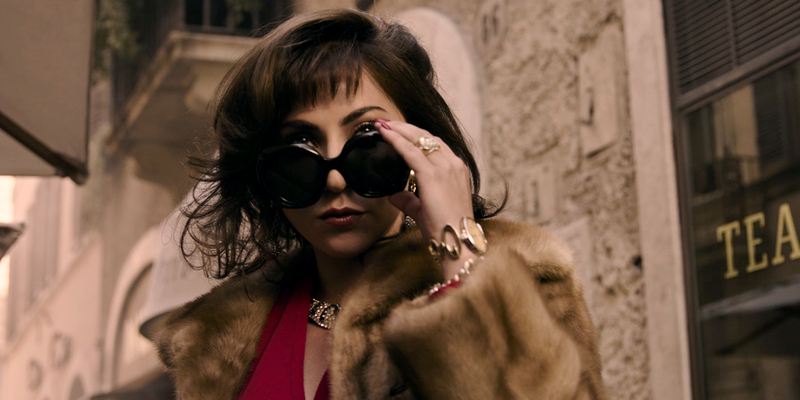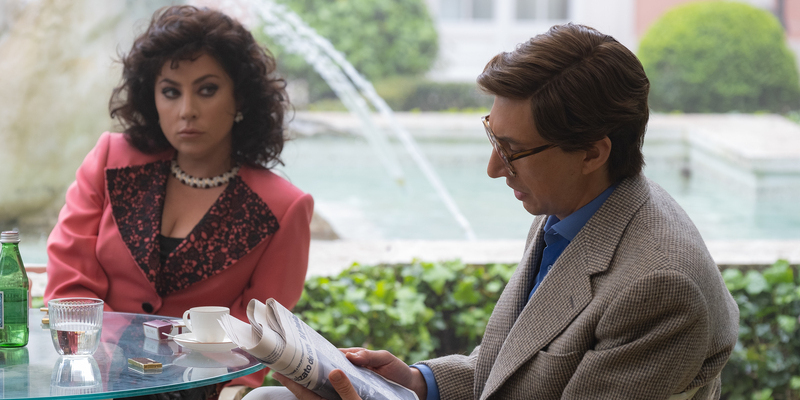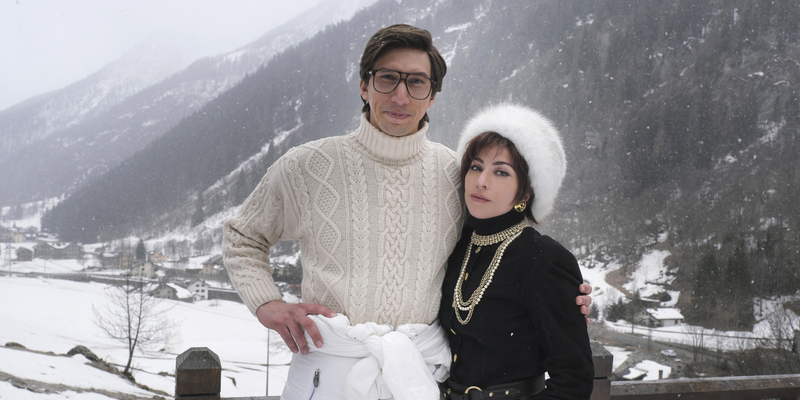
Review by
Eric Hillis
Directed by: Ridley Scott
Starring: Lady Gaga, Adam Driver, Jared Leto, Jeremy Irons, Jack Huston, Salma
Hayek, Al Pacino

There's a scene in Ridley Scott's
House of Gucci in which our anti-heroine, Patrizia
Reggiani (Lady Gaga), is mocked by a group of her husband
Maurizio Gucci's (Adam Driver) society friends for telling a
rambling story filled with unnecessary details. If only Maurizio's mates
had read the script by Becky Johnston and
Roberto Bentivegna, which to use suitable parlance, has a few too
many loose threads.
The marketing around House of Gucci, and indeed its opening flash-forward, suggest that the film is
centred on the death of Maurizio at the hands of a hitman hired by
Patrizia. Unless you’re a fashion buff, it's certainly the juiciest part
of the Gucci saga, so it's odd to see it relegated to something of an
afterthought, with the movie ending at the point where you might have
expected the story to take off.

Rather than a true crime thriller, Scott and his screenwriters have
err…fashioned an in-depth look at the business dealings of the Gucci
family over three decades. It all begins with the young gold-digging
Patrizia meeting Maurizio at a party and practically orgasming when she
learns his last name. Desperate to get Maurizio's surname and all its
trappings, Patrizia seduces the nerdy law student. Things initially
backfire when Maurizio is disowned by his father (Jeremy Irons)
for marrying a commoner. But Patrizia is determined to get Maurizio back
into the good graces of Gucci.
She does so by winning over Maurizio's uncle Aldo (Al Pacino),
who is in the process of reinventing the fashion house by appealing to
emerging markets. Thus begins a series of scenes in which contracts are
signed and various parties are screwed over.
From an opening tracking shot that follows Patrizia's shapely rump as
truckers wolf whistle in the background and an Italian pop song blares
on the soundtrack, it seems Scott is aiming for a camp and over-the-top
take on Italian popular culture. The movie is certainly at its most
entertaining when it's aping Dynasty with bad accents, but
the campness is largely pushed aside for monotonous scenes of contract
signings.

The movie's village idiot, Aldo's son Paulo (Jared Leto buried
under makeup that gives him the appearance of a clownish Dennis Franz),
wants to introduce pastels to the Gucci line, but his father insists on
browns. When Scott brings metaphorical pastels to his film in the form
of its more larger than life elements, it's a lot of fun, but too much
of the movie consists of brown stuffiness. Scott is determined to tell
us every detail about the trading history of the Gucci empire, when all
most viewers really want to see is Lady Gaga vamping it up as a
Mediterranean Alexis Colby.
Though she's the character with the most screen time, Patrizia never
comes off as anything more than a caricature of a Lady Macbeth figure.
Her leap from adoring wife to scorned vengeful killer comes out of
nowhere, and the film could do with dispensing a couple of contract
negotiations to provide her with a bit more depth.

Now approaching 90, Scott is often lauded for still making movies with
the energy of his younger self. For the most part
House of Gucci however feels like it's made by a director
in his eighties. Its storytelling is pedestrian and too reliant on
expository dialogue. The timeline is often confusing, with anachronistic
needle drops leading us to believe the film has skipped ahead several
years. By the time "1995" flashed up on screen I had no idea what year
the story had caught up with, as songs from the late '80s had been
playing over scenes set at the start of that decade (a launch party in
1983 is soundtracked by Eric B & Rakim, who didn't form until 1986 –
that DJ must have had some connections!).
There are moments that suggest the old man's still got it though. An
image of Patrizia posing on a New York balcony as rain batters the
Empire State Building behind her is one of the year's most striking.
There's a lovely moment where the police break up a fashion show and an
opera singer insists on finishing her performance regardless. But as the
story drags on we find ourselves rolling up our well-tailored sleeves to
check our designer watches and wishing a Paul Thomas Anderson, Martin
Scorsese or Paolo Sorrentino had taken on this story of great
potential.

